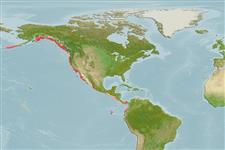Chaetoderma argenteum Heath, 1911
Glisten-worm solenogaster| Native range | All suitable habitat | Point map | Year 2050 |

|
| This map was computer-generated and has not yet been reviewed. |
| Chaetoderma argenteum AquaMaps Data sources: GBIF OBIS |
Google image |
No photo available for this species.
Classification / Names Common names | Synonyms | CoL | ITIS | WoRMS
Aplacophora | Not assigned | Chaetodermidae
Environment: milieu / climate zone / depth range / distribution range Ecology
Benthic; non-migratory (Ref. 1382); depth range 92 - 368 m (Ref. 1382). Temperate
Distribution Countries | FAO areas | Ecosystems | Occurrences | Introductions
Eastern Pacific: USA and Canada.
Length at first maturity / Size / Weight / Age
Maturity: Lm ? range ? - ? cm
Life cycle and mating behavior Maturity | Reproduction | Spawning | Eggs | Fecundity | Larvae
Main reference
References | Coordinator | Collaborators
Turgeon, D.D., J.F. Quinn Jr., A.E. Bogan, E.V. Coan, F.G. Hochberg, W.G. Lyons, P.M. Mikkelsen, R.J. Neves, C.F.E. Roper, G. Rosenberg, B. Roth, A. Scheltema, F.G. Thompson, M. Vecchione and J.D. Willams 1998 Common and scientific names of aquatic invertebrates from the United States and Canada: Mollusks, 2nd ed. American Fisheries Society (Special publication 26), Bethesda, Maryland. 526 p. (Ref. 1667)
IUCN Red List Status
(Ref. 130435: Version 2025-1)
CITES status (Ref. 108899)
CMS (Ref. 116361)
Threat to humans
Human uses
| FishSource |
Tools
More information
Diet composition
Food consumption
Predators
Max. ages / sizes
Length-weight rel.
Length-length rel.
Length-frequencies
Mass conversion
Abundance
Internet sources
BHL | BOLD Systems | CISTI | DiscoverLife | FAO(Publication : search) | Fishipedia | GenBank (genome, nucleotide) | GloBI | Gomexsi | Google Books | Google Scholar | Google | PubMed | Tree of Life | Wikipedia (Go, Search) | Zoological Record


